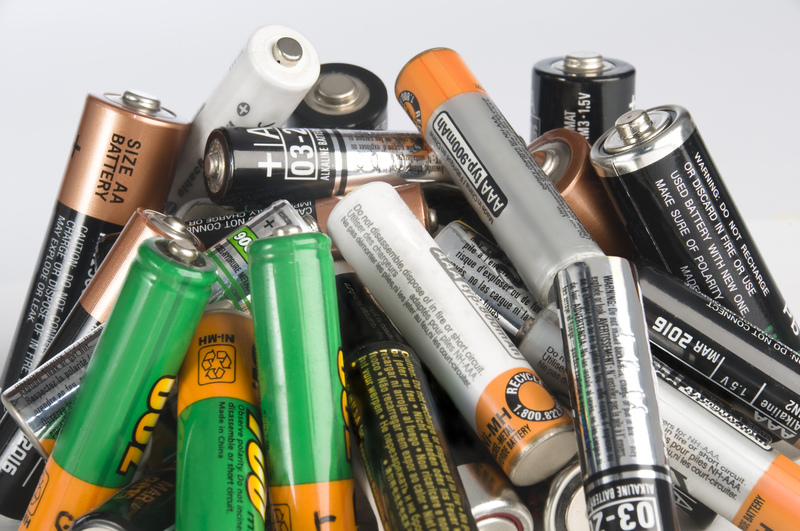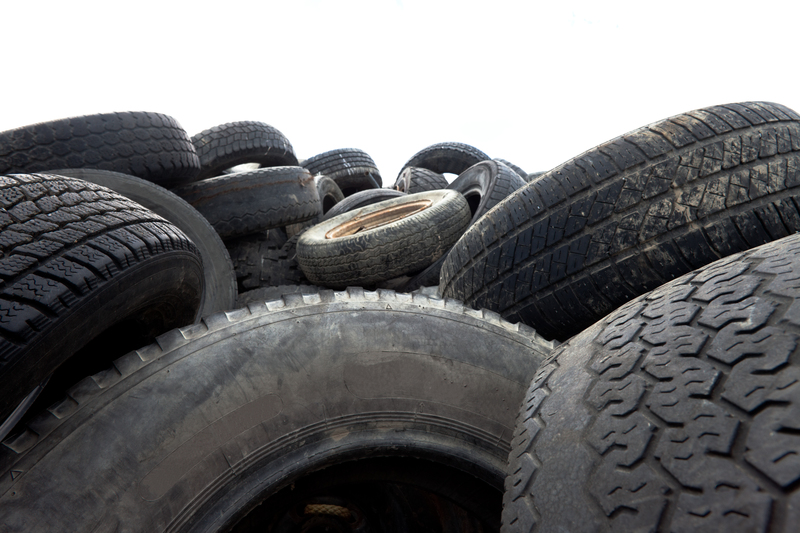Eras of Waste: How Management Techniques Have Transformed
Posted on 30/06/2025
Eras of Waste: How Management Techniques Have Transformed Over Time
The management of waste is not merely a modern concern. Throughout history, societies have grappled with methods to handle their refuse, improve efficiency, and reduce environmental impact. The transformation in waste management techniques echoes broader social, technological, and industrial development. In this comprehensive guide, let's embark on a fascinating journey through the different eras of waste--from ancient to cutting-edge--and examine how these shifts have shaped our world.

Understanding "Waste": A Historical Perspective
Waste isn't simply what we throw away. Its definition has evolved alongside human society. In ancient times, waste was mostly organic and biodegradable; today, we contend with plastics, chemicals, and e-waste. The changing nature of refuse has driven innovation in waste management techniques, pushing us to continuously adapt.
- Organic Waste: Food scraps, wood, plant material
- Industrial Waste: Byproducts of manufacturing processes
- E-Waste: Discarded electronics and batteries
- Hazardous Waste: Chemicals, medical refuse, radioactive materials
As the complexity of waste increased, so did the necessity for more sophisticated management strategies. What began as simple disposal techniques has become an intricate science--one that continually influences public health, urban planning, and environmental policies worldwide.
The Early Eras of Waste Management
1. Pre-Industrial & Ancient Times: Nature's Own Cycle
In pre-industrial societies, waste management was primarily organic. People lived in closer harmony with nature, and most waste could simply decompose. This period was defined by:
- Composting - Utilizing food scraps and animal dung to fertilize fields.
- Burning - Minimal quantities of waste were burned for warmth or disposal.
- Dumping - Non-biodegradables often ended up in pits, rivers, or designated pile areas.
The lack of population density and simple lifestyles limited environmental impact. However, with urbanization in the Greek and Roman empires, basic waste accumulation led to the construction of rudimentary sewers and the first public refuse services. This set the stage for more organized waste processing.
2. Medieval to Renaissance: The Dawn of Municipal Waste Collection
As cities grew in Europe and Asia, so did problems with public waste. Crowded streets often overflowed with rubbish, causing disease and social unrest. During this era:
- Street Cleaning: Municipalities assigned laborers to collect garbage and sweep roads.
- Landfilling: Evolving from open dumping, landfills became a preferred method.
- Zoning and Regulations: Some cities instituted laws for where and how refuse could be disposed.
Despite these incremental improvements, the sheer volume of waste was overwhelming. Public health crises, such as those caused by the Bubonic Plague, forced leaders to improve sanitation, marking an early attempt at systematic waste management solutions.
The Industrial Revolution: Epoch of Excess and Innovation
The Industrial Revolution marked a turning point in mankind's relationship with waste. Mass production led to unprecedented urban growth, creating new waste streams--from chemical byproducts to consumer paperwork.
Emergence of Modern Waste Management Practices
Key transformations during this era included:
- Incineration Plants: Burned waste to reduce landfill usage and generate heat.
- Piped Sewer Systems: Greatly improved handling of human waste, reducing disease.
- Centralized Collection Services: Regular pickup routes established in major cities.
- Recycling Beginnings: Ragpickers and scrap dealers pioneered informal recycling economies.
Waste management techniques became formalized, giving birth to the municipal waste departments we know today. However, environmental awareness was still limited, and pollution remained a serious issue--prompting the need for government intervention in the coming centuries.
Twentieth Century: Legislation, Technology, and the Age of Awareness
The Rise of Environmentalism and Regulatory Oversight
The twentieth century brought an explosion in both consumer culture and environmental consciousness. Plastics, packaging, and household chemicals changed the look of our landfills forever. In response, waste management strategies evolved in several critical ways:
- Legal Reforms: The UK's Public Health Act (1875), the US Resource Conservation and Recovery Act (1976), and similar legislation worldwide empowered governments to regulate waste disposal.
- Standardized Collection and Sorting: Households separated paper, glass, and cans for recycling--sometimes incentivized by deposit schemes.
- Innovation in Landfill Design: Modern landfills were engineered to prevent leaching and minimize odor.
- Composting and Anaerobic Digestion: Organic waste began to be transformed into compost or biogas, reducing methane emissions.
Crucially, this era saw the first international efforts to control hazardous and cross-border waste, with treaties such as the Basel Convention (1989). Such agreements set new standards for global waste management practices.
Technological Advances: Automation and Resource Recovery
Rapid technological advancements played a critical role in shaping the future of waste management. New methods and equipment allowed for more efficient collection, processing, and recycling, including:
- Automated Sorting Facilities - Technologies using magnets, optical scanners, and air jets to streamline recycling and material recovery.
- Compactor Trucks - Vehicles that reduced the volume of garbage, making transport more efficient.
- Advanced Incineration - High-efficiency plants that capture energy and dramatically reduce emissions.
- Hazardous Waste Treatment - Specialized facilities for chemical, electronic, and medical waste.
Contemporary Approaches: Circular Economy & Zero-Waste Movements
From Linear to Circular: Redefining Waste as a Resource
Today's industry leaders and policymakers emphasize the transition from a linear "take-make-dispose" model to a circular economy where waste is minimized, and resources are continuously reused. This philosophy underpins the latest waste management strategies:
- Product Stewardship: Manufacturers take responsibility for their products throughout the lifecycle, including disposal or recycling.
- Design for Disassembly: Products are conceived to be easily taken apart and recycled at end-of-life.
- Material Innovation: Bioplastics, compostable materials, and ultra-durable goods reduce the burden on landfills.
- Zero-Waste Cities: Urban centers aspire to send no waste to landfill or incineration, focusing on reduction, reuse, and closed-loop recycling.
The future of waste management lies in designing out waste before it ever has the chance to accumulate, leveraging technology and consumer engagement to rethink how materials flow through our economy.
Smart Waste Management: Technology at the Forefront
Smart technologies reshape how cities and businesses tackle their waste problems, contributing to efficiency and sustainability:
- IoT-Enabled Bins: Sensors monitor fill levels and automate collection schedules, cutting costs and emissions.
- AI and Data Analytics: Machine learning optimizes sorting, forecasts trends, and identifies inefficiencies in waste streams.
- Blockchain Tracking: Transparency in e-waste and hazardous waste movement, ensuring ethical disposal and reducing illegal dumping.
- Apps and Digital Platforms: Engaging citizens in source separation and incentivizing recycling participation.
These innovations are already unleashing a new era of waste management transformation, offering unprecedented control, traceability, and adaptability.
Key Techniques Reshaping Waste Management Today
Resource Recovery and Circular Material Use
- Material Recovery Facilities (MRFs): State-of-the-art centers where recyclables are separated, cleaned, and processed for reuse.
- Energy-from-Waste (EfW): Modern incinerators that capture heat and electricity from burning solid refuse, reducing reliance on fossil fuels.
- Biological Treatments: Composting and anaerobic digestion transform organic matter into valuable soil amendments or energy.
Decentralization and Community-Driven Programs
- Community Composting: Neighborhood-scale composting, reducing transportation emissions and boosting urban agriculture.
- Repair Cafes and Sharing Libraries: Initiatives to extend the life of products, diverting materials from both landfills and recycling streams.
- Pay-As-You-Throw (PAYT) Schemes: Households and businesses charged according to the waste generated, incentivizing reduction and recycling.
These evolving methods are sweeping across the globe, with regions adapting leading practices to fit their own ecological, economic, and cultural contexts.
The Next Era: Sustainability, Digitalization, and Global Collaboration
As climate change looms and resource scarcity intensifies, the importance of effective waste management continues to rise. The 21st century will likely see several new trends come to the fore:
- Sustainable Resource Management: Beyond focusing purely on waste, future strategies will emphasize the stewardship of Earth's resources, reducing extraction and maximizing recovery.
- Digitalization: Growing use of real-time data, AI, and connected infrastructure to track and shape waste flows on global, national, and municipal scales.
- Global Partnerships: Countries collaborating to manage transboundary waste, develop universal regulations, and share best practices.
- Consumer-Driven Change: Education, transparency, and activism pressuring manufacturers to adopt sustainable packaging and products.
The future of waste management will hinge on innovation, policy, and collective responsibility. Only by addressing waste at every stage--design, consumption, and disposal--can we hope to create a sustainable, low-waste society.

Conclusion: The Ongoing Evolution of Waste Management Techniques
From the compost heaps of the past to the data-driven solutions of tomorrow, waste management strategies have continuously adapted to the challenges of their times. Each era of waste reveals unique insights into human priorities, technological progress, and societal values.
As we stand at the crossroads of environmental urgency and unprecedented technical possibility, the transformation of waste management methods remains one of our most critical opportunities--and responsibilities. Embracing both ancient wisdom and modern innovation, we can pave the way for cleaner, more sustainable cities and a healthier planet.
Let us ensure the next era of waste is defined not by what we throw away, but by what we choose to reclaim, reuse, and respect.
Frequently Asked Questions
-
What are the most significant changes in waste management history?
The largest changes include the shift from open dumping to landfill engineering, the birth of recycling and composting, the introduction of incinerators, and the emergence of digital tools and the circular economy. -
How does modern technology improve waste management?
Technologies like IoT sensors, AI-driven sorting facilities, and data analytics improve efficiency, reduce costs, minimize environmental impact, and enhance resource recovery. -
What is the circular economy in the context of waste?
It is an economic model focused on minimizing waste, keeping products and materials in use as long as possible, and designing recycling or reuse into products from the start. -
How can individuals contribute to better waste management?
By reducing consumption, separating recyclables, composting organics, supporting circular products, and participating in public waste reduction and education programs.



